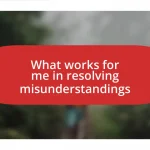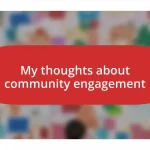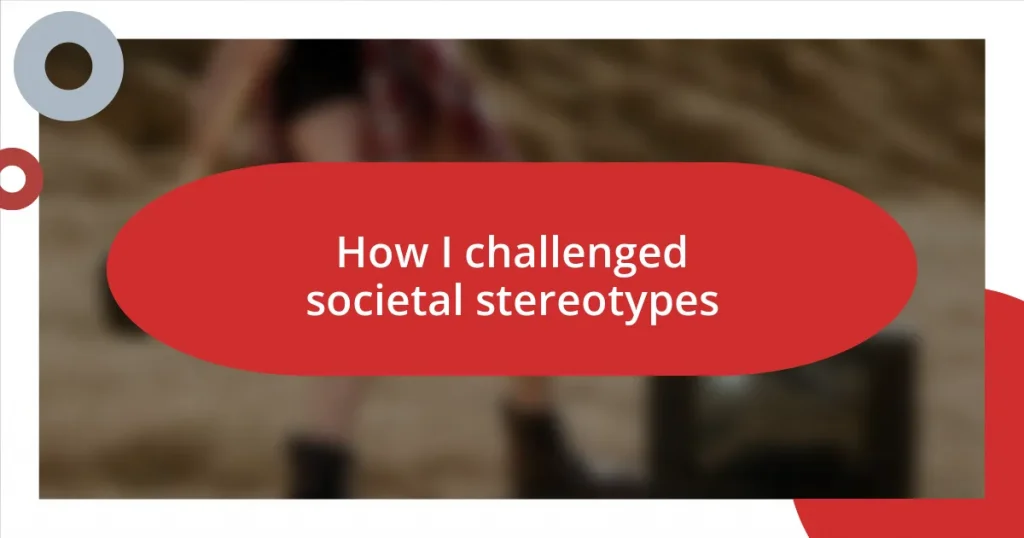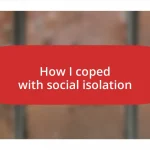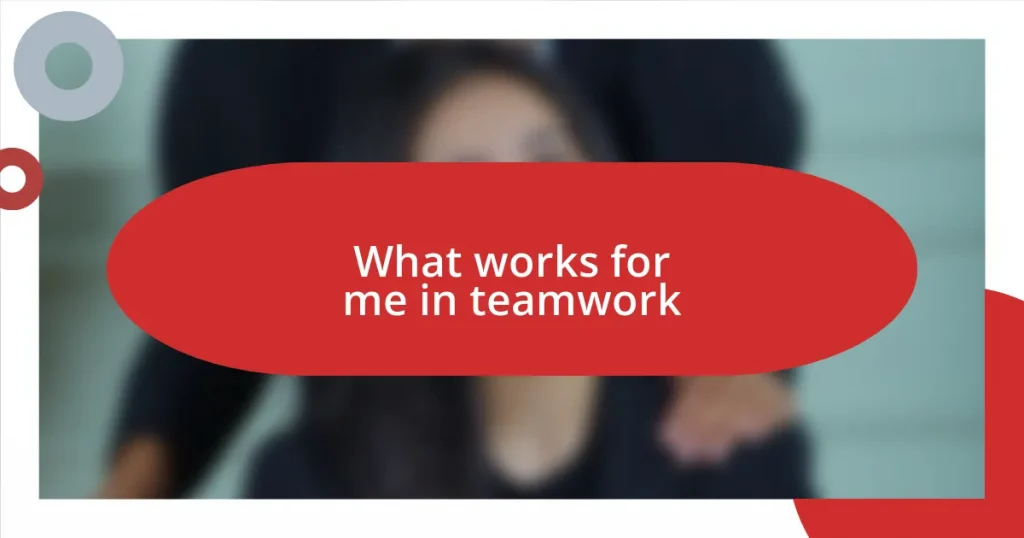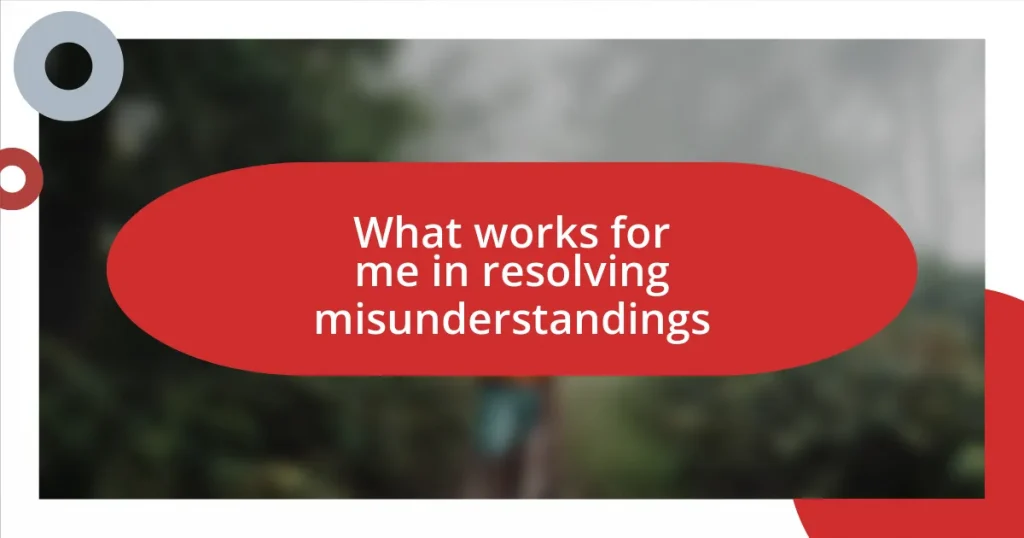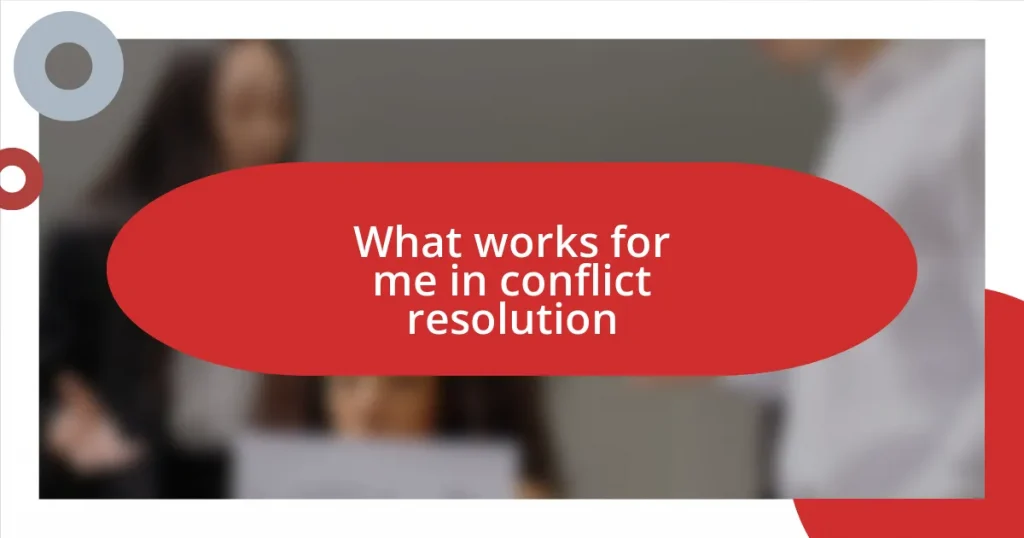Key takeaways:
- Challenging societal stereotypes is essential for personal authenticity and can inspire others to embrace their uniqueness.
- Engaging in open conversations and sharing personal stories fosters understanding and helps dismantle prejudices.
- Education and representation are crucial in breaking down stereotypes, as they illuminate diverse experiences and perspectives.
- Mentorship and celebrating small victories can empower individuals to overcome societal expectations and inspire collective change.
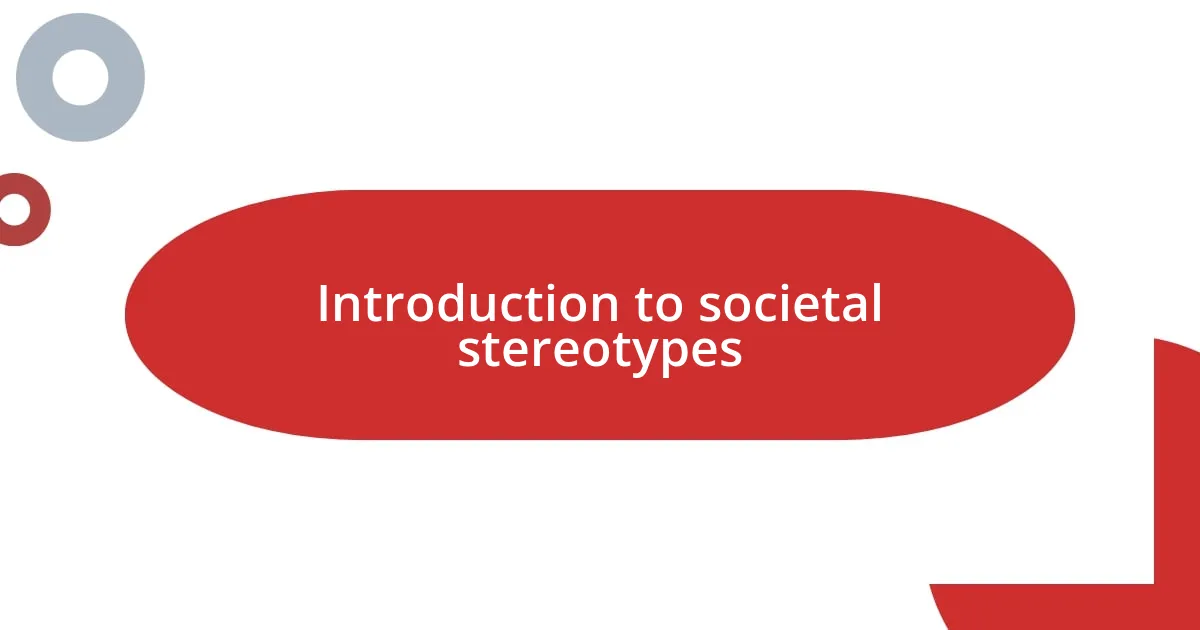
Introduction to societal stereotypes
Societal stereotypes arise from long-standing beliefs and generalizations about groups of people, often leading to misconceptions that can shape our interactions and perceptions. I remember a time in my own life when I clashed with the stereotype of what a “typical” artist should be. People often expect creativity to fit a certain mold—shouldn’t I be whimsical, unpredictable, or disorganized? It’s a thought that can be daunting.
These stereotypes can be deeply ingrained and perpetuated by culture, media, and even our upbringing. Just think about the movies or TV shows we grew up watching—how often did they depict particular groups in limiting or one-dimensional roles? I recall feeling frustrated watching friends try to fit themselves into boxes that others defined, all in the name of societal acceptance.
Challenging these stereotypes requires courage and a willingness to embrace our complexities. As I’ve navigated my own journey, I’ve witnessed the power of breaking free from societal expectations—not just for myself, but for those around me. Are we willing to redefine what it means to be ‘normal’ or ‘successful’? That question lingers as we strive for authenticity in a world that constantly pushes us to conform.
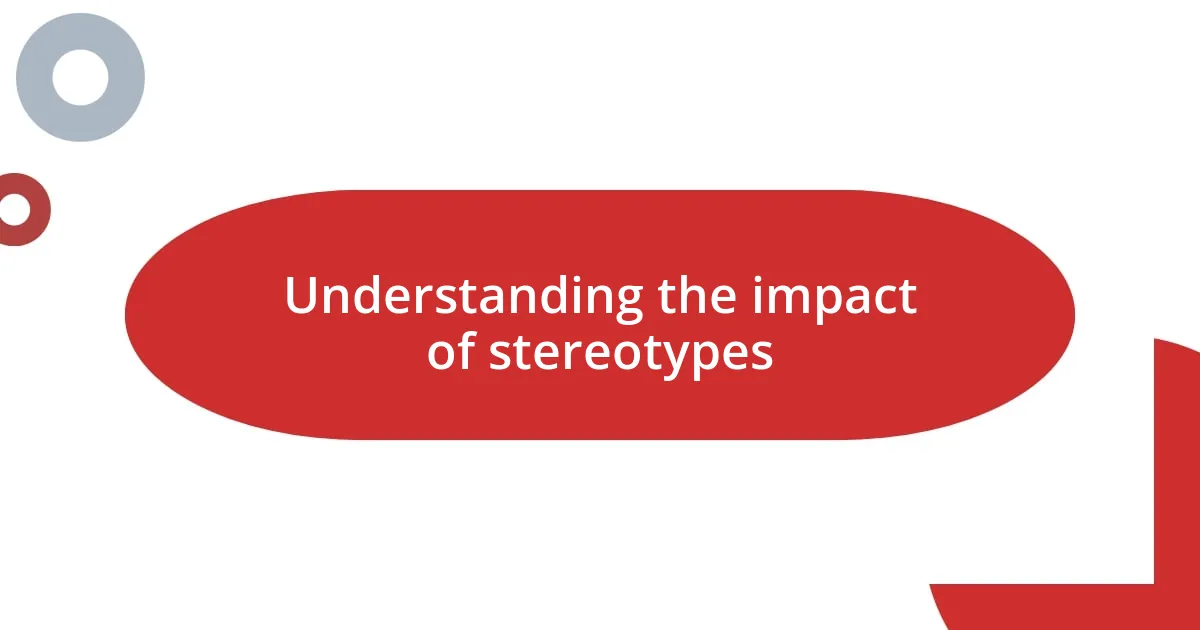
Understanding the impact of stereotypes
Understanding the impact of stereotypes is crucial because they can shape not only how we see ourselves but also how others perceive us. I remember a time in high school when my interests diverged sharply from my peers. While many gravitated toward sports, I found myself captivated by literature. The pressure to conform felt immense, but I learned that embracing what makes us unique can challenge ingrained perceptions.
Stereotypes can lead to significant emotional struggles. There were moments when I felt sidelined or even dismissed simply for my choice of hobbies. I recall attending a gathering where I was met with raised eyebrows for discussing a book during a sports-themed conversation. It took time, but I realized that questioning these assumptions is a powerful step in reclaiming our narratives.
Looking around, it’s evident how stereotypes affect interactions in various spheres—work, relationships, and social events. I’ve seen friends who felt compelled to hide aspects of themselves, fearing judgment based on superficial categories. The battle against stereotypes is ongoing, but sharing our stories can break down barriers. Each conversation we’ve had contributes to a shift in how we understand one another.
| Aspect | Impact of Stereotypes |
|---|---|
| Self-Perception | Can diminish self-esteem and encourage conformity. |
| Social Dynamics | Might create division and misunderstanding among groups. |
| Opportunities | Can limit access to resources based on preconceived notions. |
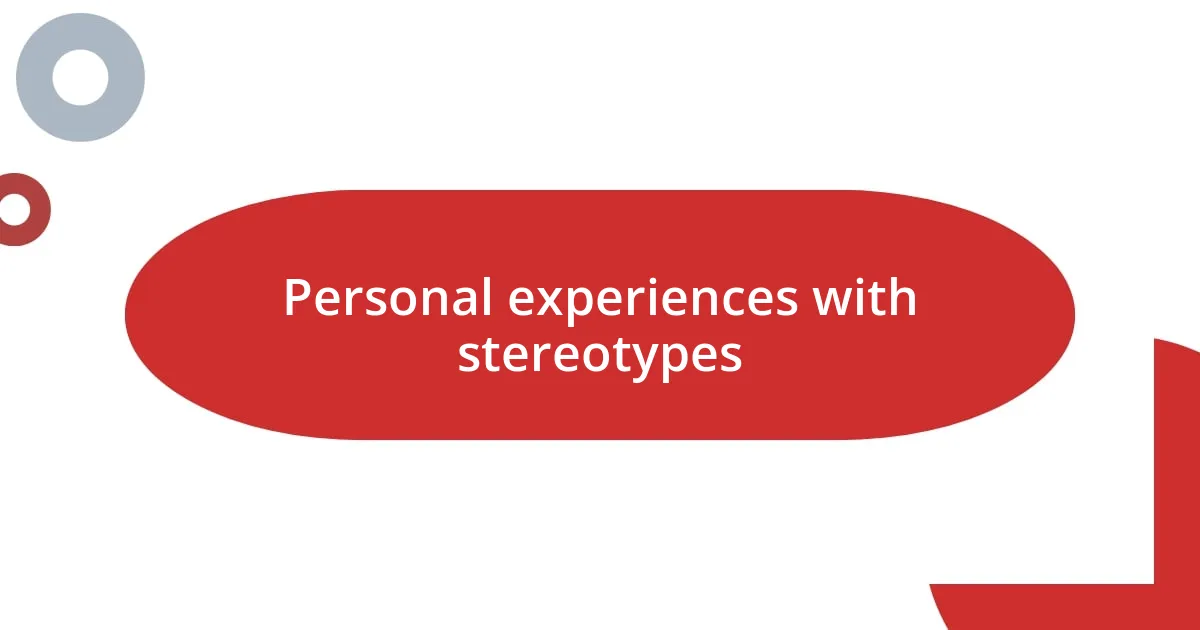
Personal experiences with stereotypes
I’ve had my share of experiences that highlight the weight of stereotypes. One moment stands out vividly—during a family gathering, I opted to wear a bright floral shirt instead of the expected “neutral tones” my relatives favored for events. The gasps were audible. Relatives whispered that I should dress more seriously. That day, I felt a mix of pride for expressing myself and frustration for being judged. It was a stark reminder that societal expectations often cast a long shadow over personal expression.
- I once auditioned for a theater role where the casting call had specific requirements for age and appearance; I didn’t fit that mold.
- When my friends teased me for being “the smart one” instead of “the fun one,” it made me question my identity.
- I remember joining a local gym and being met with surprise when I chose a dance class over a weightlifting session.
- Every time I encountered comments about my unconventional career choice, I felt both empowered to prove them wrong and discouraged by their limited views.
Interestingly, these moments, while uncomfortable, became a catalyst for deeper conversations about identity. I realized that challenging the norms could promote understanding and encourage others to also share their stories. Each experience has shaped my perspective, fostering a sense of community around embracing our unique qualities.
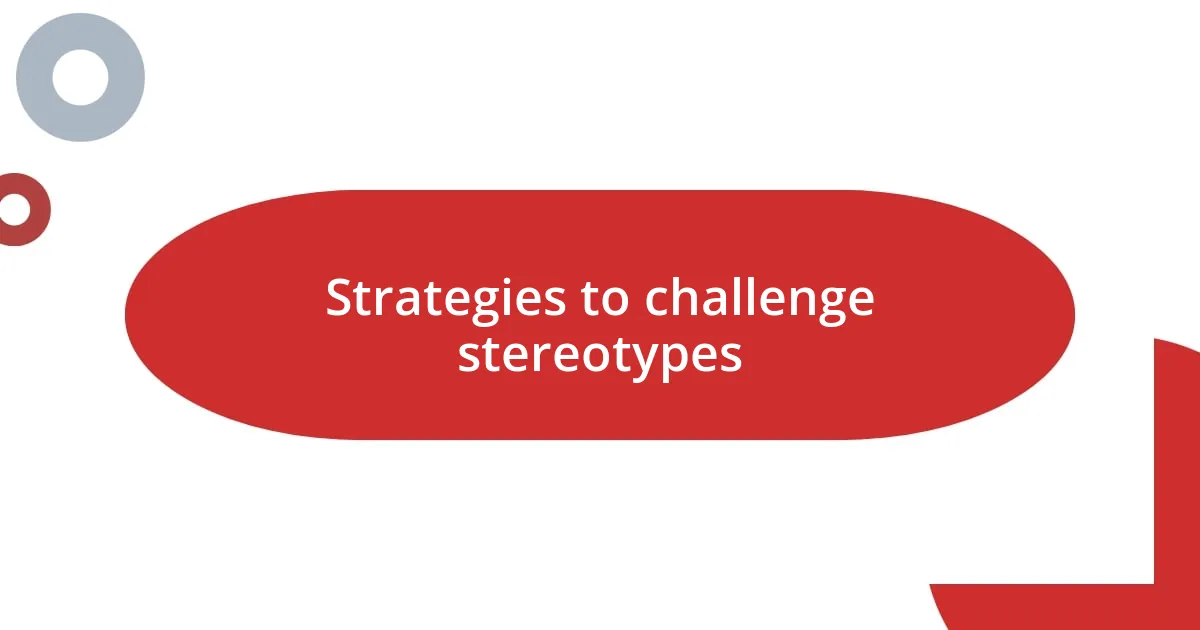
Strategies to challenge stereotypes
One effective strategy to challenge stereotypes is to engage in open conversations that encourage vulnerability. I recall a time when I hosted a small dinner with friends from varied backgrounds. Instead of sticking to safe topics, I invited everyone to share their experiences with societal expectations. The candor in that room was palpable; we laughed, cringed, and connected on levels I never anticipated. It reminded me how sharing our stories can bridge differences and break down preconceived notions.
Additionally, education plays a pivotal role in dismantling stereotypes. I once attended a workshop where speakers shared their journeys of overcoming societal labels. Hearing their stories firsthand was transformative. It made me realize that understanding someone else’s reality can profoundly shift our perspectives. I often ask myself: how can we truly challenge stereotypes if we don’t seek to learn about experiences different from our own?
Finally, actively supporting diversity through inclusive practices can create lasting change. I joined an organization that promotes representation in arts and media, and it was eye-opening to witness the impact of diverse voices gaining visibility. This enriching experience reinforced my belief that every story has value. So, how can you help amplify voices that are often sidelined? Sometimes, it’s as simple as starting a conversation or sharing a platform.
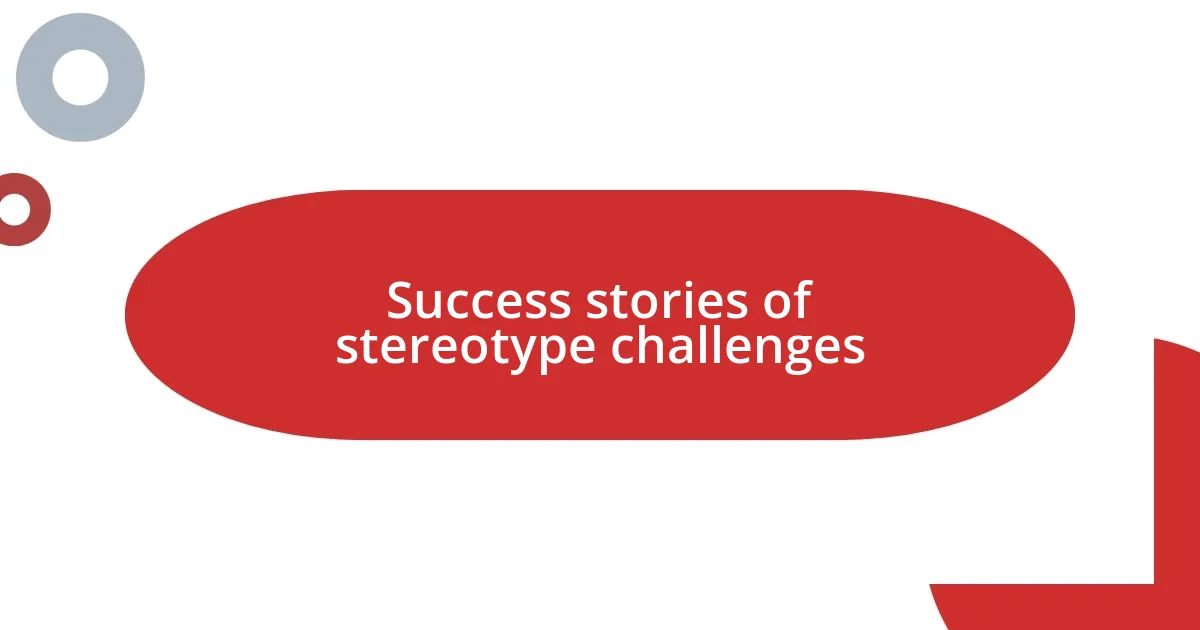
Success stories of stereotype challenges
I’ve seen firsthand the profound impact of challenging stereotypes. One of my friends broke the mold when she became the first woman in her family to pursue a career in engineering. As she navigated the male-dominated environment of her university, her confidence inspired other young women around her. Watching her thrive made me wonder: how many others could shine if given the chance?
Another moment that struck me was when a fellow gym-goer, a man with a disability, boldly took the stage in a local dance competition. Despite the odds, his performance was electrifying and broke through barriers in our community. Hearing the applause and seeing the smiles on everyone’s faces reminded me that success stories emerge when we defy expectations. Isn’t it remarkable how one person’s courage can shift perspectives and challenge ingrained beliefs?
Finally, I remember attending a panel discussion featuring LGBTQ+ entrepreneurs. They shared their journeys of overcoming discrimination while building successful businesses. Listening to their stories, I realized that vulnerability is powerful. Their resilience instilled a sense of hope within me. It’s moments like these that make me reflect: what can we learn from each other’s stories to foster a more inclusive world?
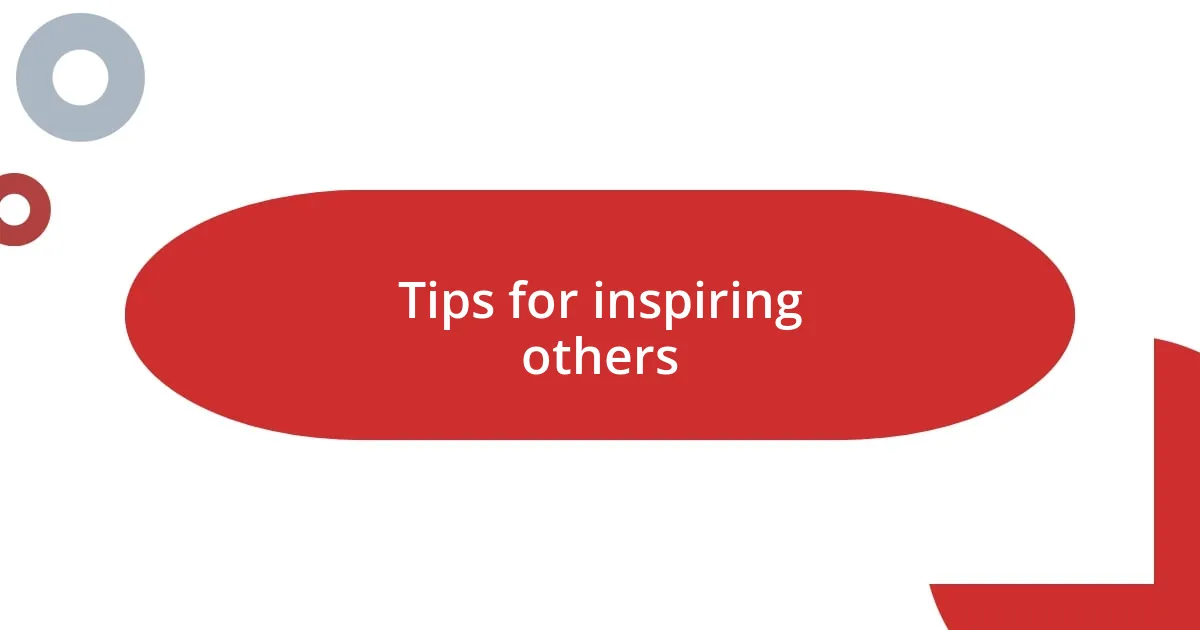
Tips for inspiring others
When it comes to inspiring others, I believe storytelling holds immense power. I once participated in a mentorship program where I shared my own struggles with societal expectations, like choosing a path in a creative field rather than a “safer” option. The response was moving; several mentees opened up about their aspirations, revealing dreams they’d held back due to fear of judgment. Isn’t it incredible how vulnerability can spark courage in others?
Another tip is to celebrate small victories publicly. I remember attending a community event where someone shared their journey of breaking free from societal norms. As they recounted their triumphs, no matter how minor, the crowd erupted in applause. This kind of recognition not only boosts the individual’s confidence but also encourages others to embrace their unique paths. It made me think: how often do we take a moment to acknowledge the wins in our personal journeys?
Additionally, fostering an inclusive environment is crucial. I participated in a book club that featured stories from diverse authors. Each meeting turned into a rich discussion, revealing new perspectives and experiences. It was heartening to see how sharing literature helped us dismantle prejudices while deepening our connections. Why not encourage others to explore diverse narratives as a way to expand understanding? This simple act can open doors to empathy and inspire collective change.
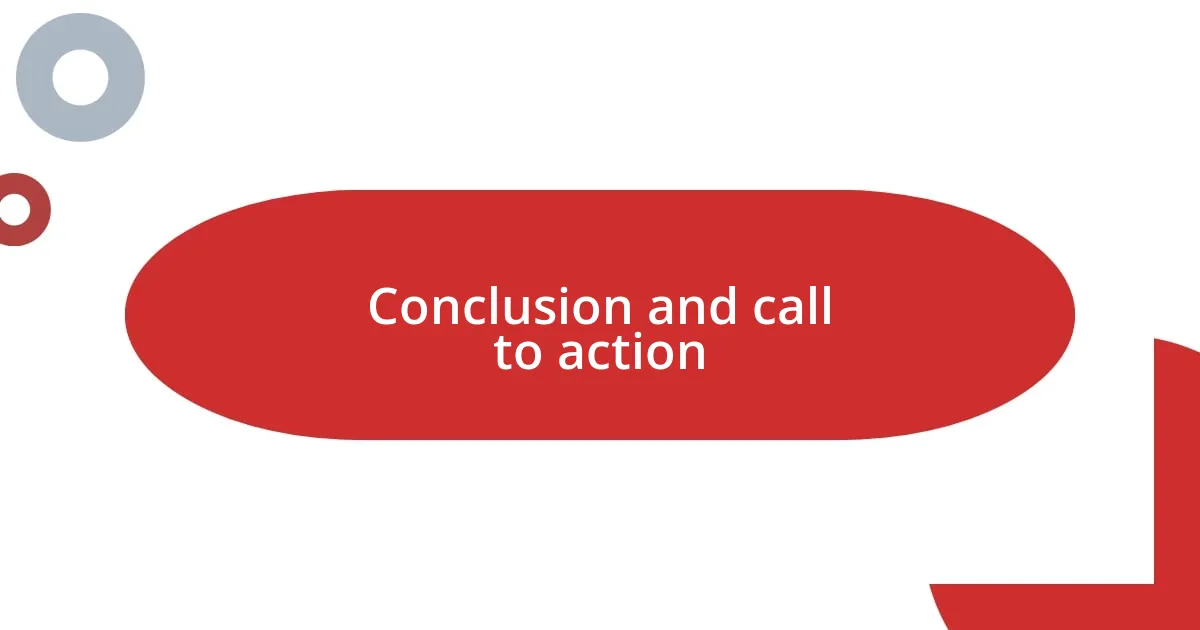
Conclusion and call to action
As we wrap up this journey, I can’t help but reflect on the transformations that occur when we challenge societal stereotypes. It’s not just about individual victories; it’s about sparking a movement. When I shared my own struggles with bias, I was met not only with understanding but also with stories from others who felt liberated by unveiling their truths. Isn’t it amazing how one conversation can ripple through a community, inspiring change far beyond what we initially imagine?
Now, I invite you to take action. Start small—maybe by sharing your own experiences in conversations or on social media. Consider speaking up when you witness someone being judged based on stereotypes. I remember feeling a rush of empowerment when I defended a colleague facing unfair assumptions at work. That moment was a testament to the power each of us holds to create a more inclusive and accepting world. Are you ready to be part of that change?
Let’s not underestimate the importance of mentorship, either. I’ve seen firsthand how guiding someone through their fears and challenges can ignite their potential. Be that beacon of hope or encouragement for someone who needs it. Whether it’s through formal programs or just a chat over coffee, your support could be the nudge they need to break free from their chains. So, what’s stopping you from reaching out and making a difference today?

